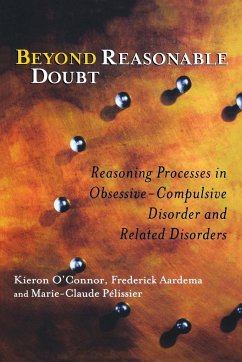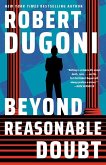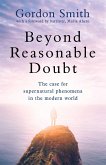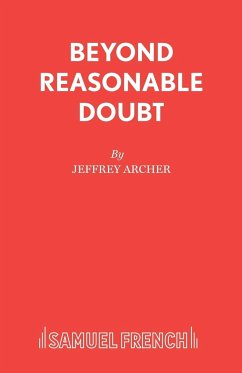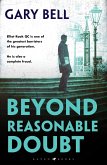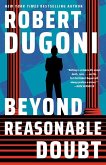Kieron O'Connor (Canada Centre de Recherche Fernand Seguin), Frederick Aardema (Canada Centre de Recherche Fernand Seguin), Marie-Claude Pelissier (Canada Centre de Recherche Fernand Seguin)
Beyond Reasonable Doubt
Kieron O'Connor (Canada Centre de Recherche Fernand Seguin), Frederick Aardema (Canada Centre de Recherche Fernand Seguin), Marie-Claude Pelissier (Canada Centre de Recherche Fernand Seguin)
Beyond Reasonable Doubt
- Broschiertes Buch
- Merkliste
- Auf die Merkliste
- Bewerten Bewerten
- Teilen
- Produkt teilen
- Produkterinnerung
- Produkterinnerung
Traditionally, obsessive-compulsive disorder has been classified as an anxiety disorder, but there is increasing evidence that it has schizotypal features - in other words it is a belief disorder. This book describes the ways in which reasoning can be applied to OCD for effective treatment regimes.
Andere Kunden interessierten sich auch für
![Beyond Reasonable Doubt Beyond Reasonable Doubt]() Robert DugoniBeyond Reasonable Doubt25,99 €
Robert DugoniBeyond Reasonable Doubt25,99 €![A Reasonable Doubt A Reasonable Doubt]() Phillip MargolinA Reasonable Doubt16,99 €
Phillip MargolinA Reasonable Doubt16,99 €![Sexual Deviance Sexual Deviance]() Sexual Deviance114,99 €
Sexual Deviance114,99 €![Beyond Reasonable Doubt Beyond Reasonable Doubt]() Gordon SmithBeyond Reasonable Doubt17,99 €
Gordon SmithBeyond Reasonable Doubt17,99 €![Beyond Reasonable Doubt Beyond Reasonable Doubt]() Jeffrey ArcherBeyond Reasonable Doubt19,99 €
Jeffrey ArcherBeyond Reasonable Doubt19,99 €![Beyond Reasonable Doubt Beyond Reasonable Doubt]() Gary BellBeyond Reasonable Doubt15,99 €
Gary BellBeyond Reasonable Doubt15,99 €![Beyond Reasonable Doubt Beyond Reasonable Doubt]() Robert DugoniBeyond Reasonable Doubt15,99 €
Robert DugoniBeyond Reasonable Doubt15,99 €-
-
-
Traditionally, obsessive-compulsive disorder has been classified as an anxiety disorder, but there is increasing evidence that it has schizotypal features - in other words it is a belief disorder. This book describes the ways in which reasoning can be applied to OCD for effective treatment regimes.
Hinweis: Dieser Artikel kann nur an eine deutsche Lieferadresse ausgeliefert werden.
Hinweis: Dieser Artikel kann nur an eine deutsche Lieferadresse ausgeliefert werden.
Produktdetails
- Produktdetails
- Verlag: John Wiley & Sons Inc
- Seitenzahl: 320
- Erscheinungstermin: 24. Januar 2005
- Englisch
- Abmessung: 229mm x 152mm x 18mm
- Gewicht: 512g
- ISBN-13: 9780470868775
- ISBN-10: 0470868775
- Artikelnr.: 13068533
- Herstellerkennzeichnung
- Libri GmbH
- Europaallee 1
- 36244 Bad Hersfeld
- gpsr@libri.de
- Verlag: John Wiley & Sons Inc
- Seitenzahl: 320
- Erscheinungstermin: 24. Januar 2005
- Englisch
- Abmessung: 229mm x 152mm x 18mm
- Gewicht: 512g
- ISBN-13: 9780470868775
- ISBN-10: 0470868775
- Artikelnr.: 13068533
- Herstellerkennzeichnung
- Libri GmbH
- Europaallee 1
- 36244 Bad Hersfeld
- gpsr@libri.de
Kieron O'Connor completed his research and clinical training in psychology at the University of Sussex and the Institute of Psychiatry and Maudsley Hospital London (UK). In 1988 he was awarded the first of a series of fellowships by the Fonds de la Recherche en Santé du Québec, and established a clinical research program at the Fernand-Seguin Research Center, Louis-H. Lafontaine Hospital, University of Montreal. The multidisciplinary research program, which focuses on obsessive-compulsive disorder, Tourette and tic disorder, and delusional disorder, is currently funded by the Canadian Institutes of Health Research. Kieron O'Connor is also Associate Research Professor at the Psychiatry Department of the University of Montreal and is scientific advisor to the Quebec OCD Foundation. He has over 100 scientific publications. Forthcoming publications include Cognitive Behavioral Treatment of Tic Disorders (Wiley, in press). Frederick Aardema studied clinical psychology at the University of Groningen and the University of Amsterdam in the Netherlands under the supervision of Prof. P.M.G. Emmelkamp in affiliation with the Fernand-Seguin Research Center located in Montreal, Canada. He currently resides in Canada and has published in international journals in the field of obsessive-compulsive disorder. In particular, his research interests include psychometric and experimental methods in the measurement of reasoning processes in OCD, as well as the application of inference and narrative based models to obsessions without overt compulsions. He is a licensed psychologist and has a private practice in Montreal, Quebec. Marie-Claude Pélissier studied psychology at the University of Quebec at Montreal in Canada and did most of her clinical training in London, England. She has been working for almost eight years in clinical research on obsessive-compulsive disorder and other OCD related disorders, which has resulted in publications in two international journals. As a licensed psychologist, she recently started her own private practice. She is also actively involved in local mental health community groups where she teaches and acts as scientific consultant on OCD.
About the Authors.
Preface.
Foreword by Paul M.G. Emmelkamp.
Acknowledgments.
1. Cognitive Approaches to Obsessive-Compulsive Disorder: An Overview.
Obsessive-Compulsive Disorder.
Cognitive Approaches to OCD.
Intrusions and Inferences in OCD.
Phobic and Non-Phobic Models of Development in OCD.
Treatment Considerations.
Conclusion.
2. Reasoning in Everyday Life.
Formal Logic and Informal Thinking.
Making Sense of the Senses.
3. Reasoning and Narrative.
Conversation and Conviction.
Inference and Imagination.
Conclusion.
4. Reasoning and Psychopathology.
Reasoning in Clinical Populations.
Reasoning Therapy.
General Conclusion.
5. An Inference-Based Approach to Obsessive-Compulsive Disorder.
Clinical and Phenomenological Investigations into Inferential Confusion.
Critical Concepts in an Inference-Based Model.
Psychometric Measurement of Inferential Confusion.
Experimental Studies of Inferential Confusion.
Clinical Trials of an Inference-Based Approach to Therapy (IBA).
Conclusion.
6. Using the IBA Treatment Manual.
Introduction to Treatment.
Step-by-Step Program.
Common Queries from Clients.
Troubleshooting Guide.
Case Studies.
7. Future Directions.
IBA and Other Cognitive Therapy.
Future Development in IBA.
A Final Comment.
Appendix 1: Overview of Our Treatment Program for Obsessive-Compulsive
Disorder.
Appendix 2: Worksheets, Exercise Sheets and Training Cards.
Appendix 3.
Appendix 4.
References.
Index.
Preface.
Foreword by Paul M.G. Emmelkamp.
Acknowledgments.
1. Cognitive Approaches to Obsessive-Compulsive Disorder: An Overview.
Obsessive-Compulsive Disorder.
Cognitive Approaches to OCD.
Intrusions and Inferences in OCD.
Phobic and Non-Phobic Models of Development in OCD.
Treatment Considerations.
Conclusion.
2. Reasoning in Everyday Life.
Formal Logic and Informal Thinking.
Making Sense of the Senses.
3. Reasoning and Narrative.
Conversation and Conviction.
Inference and Imagination.
Conclusion.
4. Reasoning and Psychopathology.
Reasoning in Clinical Populations.
Reasoning Therapy.
General Conclusion.
5. An Inference-Based Approach to Obsessive-Compulsive Disorder.
Clinical and Phenomenological Investigations into Inferential Confusion.
Critical Concepts in an Inference-Based Model.
Psychometric Measurement of Inferential Confusion.
Experimental Studies of Inferential Confusion.
Clinical Trials of an Inference-Based Approach to Therapy (IBA).
Conclusion.
6. Using the IBA Treatment Manual.
Introduction to Treatment.
Step-by-Step Program.
Common Queries from Clients.
Troubleshooting Guide.
Case Studies.
7. Future Directions.
IBA and Other Cognitive Therapy.
Future Development in IBA.
A Final Comment.
Appendix 1: Overview of Our Treatment Program for Obsessive-Compulsive
Disorder.
Appendix 2: Worksheets, Exercise Sheets and Training Cards.
Appendix 3.
Appendix 4.
References.
Index.
About the Authors.
Preface.
Foreword by Paul M.G. Emmelkamp.
Acknowledgments.
1. Cognitive Approaches to Obsessive-Compulsive Disorder: An Overview.
Obsessive-Compulsive Disorder.
Cognitive Approaches to OCD.
Intrusions and Inferences in OCD.
Phobic and Non-Phobic Models of Development in OCD.
Treatment Considerations.
Conclusion.
2. Reasoning in Everyday Life.
Formal Logic and Informal Thinking.
Making Sense of the Senses.
3. Reasoning and Narrative.
Conversation and Conviction.
Inference and Imagination.
Conclusion.
4. Reasoning and Psychopathology.
Reasoning in Clinical Populations.
Reasoning Therapy.
General Conclusion.
5. An Inference-Based Approach to Obsessive-Compulsive Disorder.
Clinical and Phenomenological Investigations into Inferential Confusion.
Critical Concepts in an Inference-Based Model.
Psychometric Measurement of Inferential Confusion.
Experimental Studies of Inferential Confusion.
Clinical Trials of an Inference-Based Approach to Therapy (IBA).
Conclusion.
6. Using the IBA Treatment Manual.
Introduction to Treatment.
Step-by-Step Program.
Common Queries from Clients.
Troubleshooting Guide.
Case Studies.
7. Future Directions.
IBA and Other Cognitive Therapy.
Future Development in IBA.
A Final Comment.
Appendix 1: Overview of Our Treatment Program for Obsessive-Compulsive
Disorder.
Appendix 2: Worksheets, Exercise Sheets and Training Cards.
Appendix 3.
Appendix 4.
References.
Index.
Preface.
Foreword by Paul M.G. Emmelkamp.
Acknowledgments.
1. Cognitive Approaches to Obsessive-Compulsive Disorder: An Overview.
Obsessive-Compulsive Disorder.
Cognitive Approaches to OCD.
Intrusions and Inferences in OCD.
Phobic and Non-Phobic Models of Development in OCD.
Treatment Considerations.
Conclusion.
2. Reasoning in Everyday Life.
Formal Logic and Informal Thinking.
Making Sense of the Senses.
3. Reasoning and Narrative.
Conversation and Conviction.
Inference and Imagination.
Conclusion.
4. Reasoning and Psychopathology.
Reasoning in Clinical Populations.
Reasoning Therapy.
General Conclusion.
5. An Inference-Based Approach to Obsessive-Compulsive Disorder.
Clinical and Phenomenological Investigations into Inferential Confusion.
Critical Concepts in an Inference-Based Model.
Psychometric Measurement of Inferential Confusion.
Experimental Studies of Inferential Confusion.
Clinical Trials of an Inference-Based Approach to Therapy (IBA).
Conclusion.
6. Using the IBA Treatment Manual.
Introduction to Treatment.
Step-by-Step Program.
Common Queries from Clients.
Troubleshooting Guide.
Case Studies.
7. Future Directions.
IBA and Other Cognitive Therapy.
Future Development in IBA.
A Final Comment.
Appendix 1: Overview of Our Treatment Program for Obsessive-Compulsive
Disorder.
Appendix 2: Worksheets, Exercise Sheets and Training Cards.
Appendix 3.
Appendix 4.
References.
Index.

